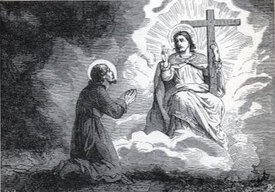Where and how do we seek communion in prayer with God? Catholics enter into communion with God through the Blessed
Trinity. I purposely ask the question this way because so often I meet Catholics who have fallen into a quasi-Protestant manner of thinking and praying. They say, "My prayer is a relationship with Jesus." They go no further. They also rarely give an indication that there are two other persons of the Blessed Trinity. Certainly, we all are to seek an intimacy with the Lord Jesus, but as Catholics
our theology and its manifestation in the spiritual life through the sacred
Liturgy and personal prayer is always in conversation with the Trinity: Father,
Son and Holy Spirit. This is an essential point in the spiritual life. You miss this point, you miss the point of Catholic prayer. In fact, all of our liturgical prayer, save for a few, is
directed to the Father, through the Son under the power of the Holy Spirit.
Catholics ought not be functionally unitarian: prayer exclusively directed to
one member of the Trinity but it ought to be trinitarian: Father, Son AND Holy Spirit. In 1989,
Cardinal Ratzinger, with his typical clarity, addressed this issue in a "Letter to the Bishops of the
Catholic Church on some Aspects of Christian Meditation." He said, in part:


"From
the dogmatic point of view," it is impossible to arrive at a perfect love of
God if one ignores his giving of himself to us through his Incarnate Son, who
was crucified and rose from the dead. In him, under the action of the Holy
Spirit, we participate, through pure grace, in the interior life of God. When
Jesus says, "He who has seen me has seen the Father" (Jn 14:9), he does not
mean just the sight and exterior knowledge of his human figure (in the flesh is
of no avail"--Jn 6:63). What he means is rather a vision made possible by the
grace of faith: to see, through the manifestation of Jesus perceptible by the
senses, just what he, as the Word of the Father, truly wants to reveal to us of
God ("It is the Spirit that gives life [...]; the words that I have spoken to
you are spirit and life"--ibid.). This "seeing" is not a matter of a purely
human abstraction ("abstractio") from the figure in which God has revealed
himself; it is rather the grasping of the divine reality in the human figure of
Jesus, his eternal divine dimension in its temporal form. As St. Ignatius says
in the Spiritual Exercises, we should try to capture "the infinite perfume
and the infinite sweetness of the divinity" (n. 124), going forward from that
finite revealed truth from which we have begun. While he raises us up, God is
free to "empty" us of all that holds us back in this world, to draw us
completely into the Trinitarian life of his eternal love. However, this gift
can only be granted "in Christ through the Holy Spirit," and not through our
own efforts, withdrawing ourselves from his revelation (20).
I would recommend reading Cardinal Ratzinger's full letter to the bishops; it is linked above.


Leave a comment